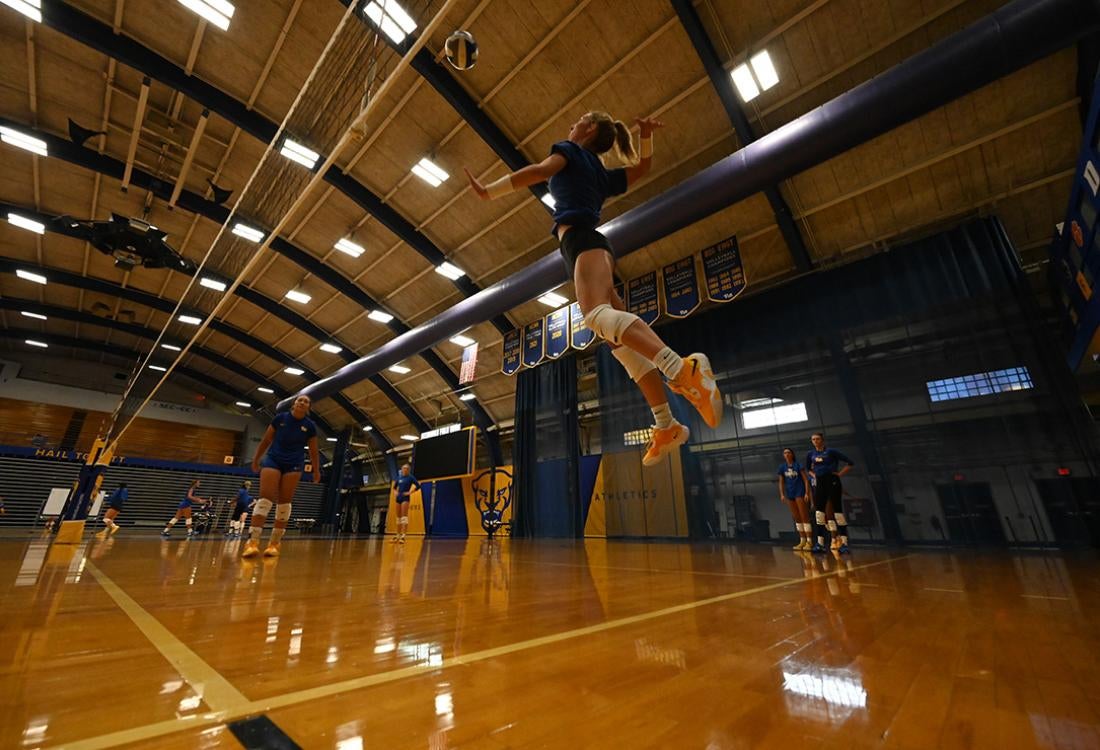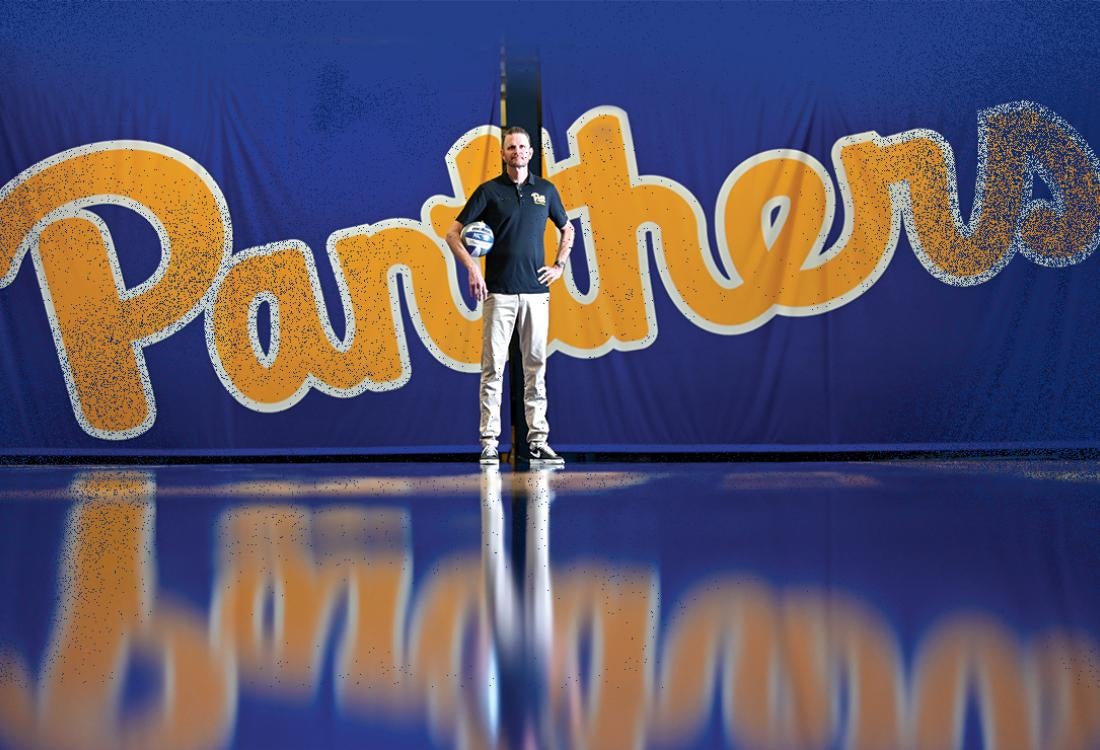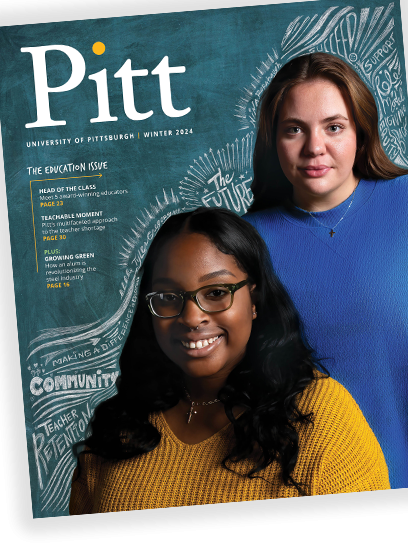
Pitt’s volleyball team has never encountered anything quite like it. The University of Wisconsin fans have heeded a call to wear red, and, as they file into the UW Field House in Madison to watch their Badgers take on the Panthers in the National Collegiate Athletic Association (NCAA) regional finals, they appear to form four impenetrable crimson walls around the volleyball court.
The Badgers are the defending national champions and undefeated at home this season, so their fans have reason for optimism. As game time nears, their excitement swells until it reaches a full-bellied roar, rattling the floorboards.
From her spot on the Pitt sideline, senior legal studies major and middle blocker Chiamaka Nwokolo surveys the scene and suppresses a smile. She knows something the frenzied Wisconsin fans do not: This Pitt team cannot be intimidated.
They’ve learned to thrive on pressure. The louder the crowd and the higher the expectations, the tougher they play, with head coach Dan Fisher’s mantra running on an endless loop in their heads: “We don’t know if we’re going to win, but we know we can win.”
And they really can. Over the previous five seasons, the Panthers have proven their might, amassing the winningest record in Division I volleyball, four Atlantic Coast Conference (ACC) championships and three straight NCAA Elite Eight appearances. Their roster on this night in December 2022 boasts five players, including Nwokolo, who have been named to All-America teams for being among the country’s top collegiate volleyball players.
The match with Wisconsin is breathtakingly tight. It takes three hours, seven minutes, five sets, 18 ties and nine lead changes, but Pitt comes out on top. As the volleyball falls, untouched, on Wisconsin’s side of the net for the final time, Nwokolo turns toward her teammates and falls to her knees.
They’ve done it.
The Panthers have dethroned the reigning champs, and they’re going to play in the NCAA semifinal match. They may even get a shot at the coveted trophy Pitt volleyball has been chasing for nearly five decades — a national championship.
Deep Roots
The University of Pittsburgh is known as an athletic powerhouse, hailed for the success of its football and basketball programs. But that national sports coverage and acclaim often overshadows another Pitt program with roots that run nearly as deep and whose success over the past 10 years surpasses all the others.
Pitt launched its women’s volleyball program in 1974, shortly after Title IX became law, giving men and women equal opportunities in sports. They enjoyed immediate success. In that first season, despite two starters having never played the game before, the team went 14-3 and advanced to the quarterfinals of the regional championships.
That success grew throughout the ’70s under head coach Mike Hebert, who marched the Panthers to national prominence with two regional championships, two national tournament appearances and a stunning 40-win season.
Though the Hebert era lasted just four years, both coach and program used the partnership to spring-board to bigger achievements. Hebert went on to garner legendary status at Illinois and Minnesota, where he racked up multiple conference championships, NCAA appearances and national coach of the year awards over three decades. The Panthers, meanwhile, won 11 Big East tournament championships — more than any other team in conference history — including seven straight between 1988 and 1994.
But Pitt’s dominance over the volleyball world began to waver in the late 1990s. The team posted its first-ever losing record in 2001, snapping one of the longest winning streaks in NCAA volleyball history. The teams of the early 2000s, though successful, weren’t quite as dominant as their predecessors. In 2013, as Pitt Athletics prepared to jump from the Big East Conference to the ACC, sights were set on reconnecting the volleyball team with its championship roots.
So, the administration called on the team’s old friend Hebert, who by then had been inducted into the American Volleyball Coaches Association (AVCA) Hall of Fame, to conduct a national search for a new head volleyball coach. They wanted a visionary, someone who could lead the program back to prominence and, perhaps, even procure that elusive national championship.
Hebert had just the guy.
Wired Differently
Dan Fisher grew up in Goleta, California, a small city built atop a fertile stretch of coastline in Santa Barbara County. From the time he was a kid, it was clear he was “wired a little differently,” Fisher says. Hobbies quickly became obsessions. Long after his friends had retreated to video games or television for the day, Fisher continued his relentless quests to perfect an ollie on his skateboard or a foul shot on the basketball court.
By the time he was 16, Fisher had turned that laser focus on volleyball.
Volleyball is a way of life in California. Pickup games are in constant progress on the beaches and even the casual fan can easily define a dig (a defensive bump of the ball that keeps it from hitting the ground) and a kill (an unreturnable hit that leads to a point). Fisher’s older brother was first in the family to pick up the sport but, unsurprisingly, it was Fisher who put in the work needed to be recruited by college programs.
He played volleyball for three different programs over four years, finally finishing his degree at the University of the Pacific. After graduation, he opted to go abroad, where he signed with a professional organization in Spain.
“Playing overseas was like a classical education,” Fisher says. “I learned to speak Spanish, and I started thinking differently, too. I began to see new perspectives. I’ve never really gotten over that.”
He also coached youth volleyball in Europe. Fisher always thought he’d be a teacher or counselor when his playing days were over, so coaching wasn’t such a leap, and he found young players responded well to his brand of detailed instruction and endless encouragement.
Once Fisher settled on this new career path, he traversed it with astonishing speed. It took just seven seasons and three assistant positions before he won the women’s head coaching role at Concordia University Irvine in 2011 and guided the team to uncharted heights.
In 2011, the Concordia Golden Eagles made it to the National Association of Intercollegiate Athletics (NAIA) championship game and Fisher was named NAIA/AVCA Coach of the Year. They followed up that first season by going undefeated in 2012 on the way to a national championship.
That’s when the volleyball world really took notice.
Fisher was asked to join the 2012 Pan American Cup team to scout opponents and set offensive strategy alongside some of the sport’s coaching legends, including Mike Hebert. By the end of Team USA’s gold medal run, Hebert was convinced Fisher had both the demeanor and talent to coach NCAA Division I.
Fisher had also been considering a leap to DI, but he never dreamed he’d have a shot at a top-tier program. Yet when Hebert put together a list of candidates for Pitt’s 2013 search, Fisher was at the top of it, and the young coach immediately impressed both the search committee and the athletics department.
They offered him the job.

Fire and Grit
Kamalani Akeo stitched together a stellar high school volleyball career in Hawaii, taking her team to the state championship game two years in a row. But, thanks to a knee injury suffered during her senior year, only one DI school came calling — the University of Pittsburgh.
It wasn’t the most enticing prospect for Akeo, who was worried about leaving her tight-knit family and moving across the country. But she wanted to play volleyball at the highest level possible. So, in 2014, she flew to Pittsburgh to meet the team and its first-year head coach.
Net Potential
Pitt volleyball head coach Dan Fisher wants to help his student-athletes grow on the court and as people. Each year, he assigns his players a specially curated reading list meant to inspire and inform. Up your own game by tapping into three of his go-to titles.
“Mindset: The New Psychology of Success” by Carol S. Dweck
Dweck, a Stanford University psychologist, believes adopting a growth mindset can change the way people think about their abilities and lead to greater success.
“The Talent Code” by Daniel Coyle
Using neurological research and examples from nine of the world’s hotbeds of talent, Coyle examines how to optimize your abilities.
“Man’s Search for Meaning” by Viktor E. Frankl
In this classic, Frankl reflects on his time in a Nazi concentration camp and shows how to achieve meaning in the face of adversity and despair.
She spent much of the weekend lost inside her own head, frantically processing all the new information and experiences that seemed to be barreling toward her at lightning speed. The team, the facilities, the University’s sprawling urban campus and high-level academic offerings. But one thing stood out against that hazy backdrop.
“I couldn’t put into words the feeling of love and care I felt from the team,” Akeo says. “I could tell they were a family, that they loved each other. And when you love someone, you are going to fight for them, and you’re going to fight with them. I knew they would have my back.”
At the core of that camaraderie, tending to it with obvious care and diligence, was Dan Fisher.
Any good coach, no matter the sport, adopts a guiding philosophy — a set of principles that establish expectations and inform decision-making for staff and players. Fisher’s philosophy is built upon growth. He sees the potential in each player, finds the upside of every failure and preaches the power of hard work. They are beliefs he lays bare for recruits and expects players to adopt.
For Akeo’s recruiting class — Fisher’s first — that philosophy was their fuel, both in the classroom and on the court.
“We all had something to prove,” Akeo says. “We were all under-recruited or maybe a little smaller. People didn’t appreciate us for our value, but Fish saw something in us. He saw our potential.”
And they worked hard to reach it. Much like Fisher in his skateboarding days, Akeo’s recruiting class didn’t quit until they got it right. They were the last in the gym at night and the first to practice in the morning. That do-what-it-takes mentality has become a trademark of Pitt volleyball under Fisher. Partly, it’s nature. Fisher recruits players who have that fire and grit baked into their personalities. But partly, it’s nurture. Fisher understands that for the whole to succeed, each piece must be strong — physically and mentally.
“I don’t have the ego to think I’m the best coach for each individual player,” Fisher says, “but I can connect with each individual person. The more you get to know them as people, the better coach you can be to them. Athletes want a partner. They want someone to push them, and they want to know that we’re doing this together.”
In the compressed world of college sports, where coaches’ access to players is dictated by time — typically four years — and NCAA rules, Fisher’s approach to player growth and development is deliberate. Each season, he meets players one-on-one for coffee, where they can talk about whatever is on their minds. Sometimes that’s volleyball, but more often it’s just life — being a student, missing their families, thinking about the future.
Based upon those meetings and their work at practice, Fisher and his coaches come up with personalized summer reading lists for their returning players, ensuring that they are expanding their minds through volleyball, as well as through their studies. A few are standards and required reading for all players —“Mindset” by Carol S. Dweck, “The Talent Code” by Daniel Coyle, “Man’s Search for Meaning” by Viktor E. Frankl — but others are inspired by individual strengths and challenges.
Recently, Fisher also employed the help of a sports psychologist to work with the team, emphasizing the mental aspect of the game. The practice has become excellent fodder for sports color commentators, who bring it up during nationally televised games, but it’s also yielded a sense of resiliency, confidence and an “on-the-hunt” mentality that make games like the one in Wisconsin a welcome challenge rather than a stress-inducing one.
And no one can argue the results on the court.
In Fisher’s 10 seasons, the Panthers have won 258 of 320 games. (That’s a winning percentage of .806.) They have made seven consecutive NCAA tournament appearances, including two Final Four runs. Some sportswriters have suggested he is leading a dynasty. (Fisher pointedly ignores any mention of the word.)
His players have also excelled individually, on the court and in the classroom. Over 10 seasons, Pitt players earned an astonishing number of amateur athlete awards: 14 All-America, 18 All-Region and 21 All-ACC selections.
Ten players from the Fisher era have a brick on Pitt’s prestigious Varsity Walk, which honors scholarly, athletic and leadership achievements. That includes Akeo, who is now Fisher’s assistant coach (and whose younger sister, Lexis, followed her to Pitt to play for Fisher); health services major Courtney Buzzerio, who recorded 461 kills last season — second-most in Pitt modern-scoring-era history; and Serena Gray, who is one of only two players to ever earn Academic All-American (with a perfect 4.0 in her applied developmental psychology graduate program), AVCA All-American and
All-Conference honors in the same season. Kayla Lund, who racked up more than 1,000 kills and 1,000 digs between 2017 and 2021 while maintaining a 3.46 GPA, is the other.
This kind of success isn’t just good news for Pitt players; it’s good for the entire Pitt community. Volleyball is having a moment: 1.2 million people watched the 2021 NCAA championship on ESPN, making it the most-viewed women’s college volleyball match ever, and The Wall Street Journal estimates volleyball is now the second-most popular sport for high school girls, ahead of basketball. At Pitt, volleyball’s popularity and this team’s dominance have translated to unprecedented fan engagement. Last year, volleyball set a record for the largest average attendance for a season (1,726) and the largest attendance at a conference match (3,556).
“Under the direction of Coach Fisher, Pitt volleyball has truly become a national brand,” says Pitt Director of Athletics Heather Lyke. “He has built a program that is now annually contending for the NCAA championship. In addition to exceptional success on the court, we are extremely proud of the fact that every single student-athlete from our 2022 Final Four squad was named to the ACC’s Academic Honor Roll. Our goal for Pitt Athletics is to compete and achieve at the highest levels and our volleyball program embodies that aspiration in so many ways.”
But for all the winning and all the accolades, the Pitt volleyball program is still chasing the ultimate prize.
Another Shot
On Dec. 15, 2022, just five days after claiming victory over Wisconsin, the Panthers faced a familiar foe in the NCAA national semifinal game—the Louisville Cardinals. The schools are ACC rivals, having combined to win the last six ACC tournaments. The match was a fierce one.
In the end, behind a trio of season-best performances, Louisville prevailed in a five-set match.
For some players, it was a devastating end to their collegiate careers. For others, like Nwokolo, it was the impetus to return for a fifth year of eligibility and one more shot at glory, despite having already lined up a full-time job at a Pittsburgh law firm.
“The 9 to 5 can wait,” she says. “I’m going to ball with my girls.”
For Fisher, the defeat was, as most challenges are, simply a problem to be solved.
And he may already have his answer in the 2023 recruiting class — spearheaded by associate head coach Kellen Petrone—which ranks as eighth-best in the nation and Pitt’s highest rated ever.
One afternoon in late June, those four recruits joined their teammates at Fitzgerald Field House for their first week of open gym, a practice run by upperclassmen. Even Nwokolo, who knows the team’s tight culture well, is surprised by the easy, immediate way new players click with the old. They sound like a well-rehearsed symphony—the pop of a palm against the ball, the celebratory whoops when a serve lands just right, the chants that accompany each leap and hit.



